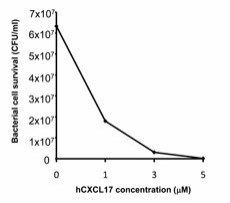- Regulatory Status
- RUO
- Other Names
- VEGF co-regulated chemokine 1 (VCC-1)

-

Bactericidal activity of human CXCL17 against E.coli.
| Cat # | Size | Price | Quantity Check Availability | ||
|---|---|---|---|---|---|
| 585304 | 25 µg | $335.00 | |||
| 585306 | 100 µg | $722.00 | |||
Select size of product is eligible for a 40% discount! Promotion valid until December 31, 2024. Exclusions apply. To view full promotion terms and conditions or to contact your local BioLegend representative to receive a quote, visit our webpage.
CXCL17 is the latest identified member of the CXC chemokine family and may contribute to tumor angiogenesis and progression. Ectopic expression of human CXCL17 in HUVEC significantly upregulated the RNA level of genes involved in angiogenesis including VEGF-A and basic FGF. NIH3T3 cells overexpressing human or mouse CXCL17 developed rapid growing tumors in mice. In vitro chemotaxis assay shows that human CXCL17 can induce migration of CD14+ monocytes and CD11c+ immature dendritic cells from human peripheral blood, and mouse CXCL17 can induce CD11b+Gr1highF4/80− cells from mouse spleen cells. CXCL17 also shows broad antimicrobial activity by disrupting bacterial membrane. High levels of CXCL17 have been detected in bronchoalveolar lavage fluid of patients with idiopathic pulmonary fibrosis.
Product Details
- Source
- Human CXCL17, 96 amino acids Leu24-Leu119 (Accession# NP_940879) was expressed in E. coli.
- Molecular Mass
- The 96 amino acid recombinant protein has a predicted molecular mass of approximately 11.3 kD. The DTT-reduced protein migrates at approximately 11.3 kD and non-reduced protein migrates at approximately 24 kD by SDS-PAGE. The N-terminal amino acid is Leucine.
- Purity
- >98%, as determined by Coomassie stained SDS-PAGE.
- Formulation
- 0.22 µm filtered protein solution is in PBS.
- Endotoxin Level
- Less than 0.01 ng per µg cytokine as determined by the LAL method.
- Concentration
- 10 and 25 µg sizes are bottled at 200 µg/mL. 100 µg size and larger sizes are lot-specific and bottled at the concentration indicated on the vial. To obtain lot-specific concentration and expiration, please enter the lot number in our Certificate of Analysis online tool.
- Storage & Handling
- Unopened vial can be stored between 2°C and 8°C for up to 2 weeks, at -20°C for up to six months, or at -70°C or colder until the expiration date. For maximum results, quick spin vial prior to opening. The protein can be aliquoted and stored at -20°C or colder. Stock solutions can also be prepared at 50 - 100 µg/mL in appropriate sterile buffer, carrier protein such as 0.2 - 1% BSA or HSA can be added when preparing the stock solution. Aliquots can be stored between 2°C and 8°C for up to one week and stored at -20°C or colder for up to 3 months. Avoid repeated freeze/thaw cycles.
- Activity
- Bioactivity was measured by its antimicrobial activity (E.coli) in a dose dependent manner.
- Application
-
Bioassay
- Application Notes
-
BioLegend carrier-free recombinant proteins provided in liquid format are shipped on blue-ice. Our comparison testing data indicates that when handled and stored as recommended, the liquid format has equal or better stability and shelf-life compared to commercially available lyophilized proteins after reconstitution. Our liquid proteins are verified in-house to maintain activity after shipping on blue ice and are backed by our 100% satisfaction guarantee. If you have any concerns, contact us at tech@biolegend.com.
-
Application References
(PubMed link indicates BioLegend citation) -
- Pisabarro MT, et al. 2006. J. Immunol. 176:2069.
- Weinstein EJ, et al. 2006. Biochem. Biophys. Res. Commun. 350:74.
- Burkhardt AM, et al. 2012. J. Immunol. 188:6399.
- Matsui A, et al. 2012. PLoS One. 7:e44080.
Antigen Details
- Structure
- CXC Chemokine
- Distribution
-
CXCL17 is a mucosal expressed chemokine, and its RNA has been detected in the respiratory system, digestive system, and reproductive tract. In the gut, CXCL17 is expressed by epithelial cells.
- Function
- CXCL17 chemoattracts monocytes and immature dendritic cells. A transcriptional microarray experiment shows co-regulation of CXCL17 with three other genes involved in angiogenesis (VEGF, IL-8, GRO1). CXCL17 was found to be significantly upregulated in various breast carcinoma and colon tumors.
- Ligand/Receptor
- Unknown
- Cell Type
- Dendritic cells
- Biology Area
- Angiogenesis, Cell Biology, Immunology, Innate Immunity
- Molecular Family
- Cytokines/Chemokines
- Gene ID
- 284340 View all products for this Gene ID
- UniProt
- View information about CXCL17 on UniProt.org
